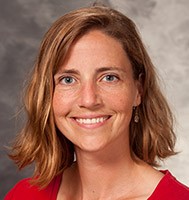Telehealth for the Interprofessional Team: Wisdom from the Field
The benefits of telehealth are clear: when high-quality care is safe and convenient, people are more likely to seek it. In the wake of the COVID-19 pandemic, providers are experiencing exponential growth in patient desire for telehealth options. This course outlines the standards and best practices to use as a roadmap for designing a top-notch telehealth practice.
In this session learners will learn from a panel of clinicians who share their experiences with practicing via telehealth, discuss implications of using technology, and offer guidance on skills and standards necessary to met the demand for care delivered via telehealth now and in the future.
ELEMENTS OF COMPETENCE
This activity changes learner competence and focuses on these elements:
- American Board of Medical Specialties: Patient care and procedural skills and interpersonal communication skills
- National Academy of Medicine: Providing patient-centered care
- Center for the Advancement of Pharmacy Education: Communication and patient-centered care
- Interprofessional Education Collaborative and Nursing: Roles/responsibilities and teams and teamwork
Intended Audience
We designed this course for advance practice nurses, nurses, pharmacists, physicians, physician assistants, social workers, and others who use telehealth within their clinical practice.
Learning Objectives
By the end of the course, professionals as members of the healthcare team will be able to:
- Explain the differences between delivering in-person versus telehealth care, including the risks, benefits, and appropriate use(s) for each telehealth modality and when to initiate or transition a telehealth encounter to a different telehealth modality or in-person care.
- Prepare the interprofessional healthcare team, to engage patients via telehealth, and develop clear team roles and responsibilities to deliver a successful telehealth encounter.
- Describe tips for completing a remote assessment.
- Identify physical findings that can and cannot be obtained via remote care and discuss how to collaborate with the patient to acquire findings.
- Incorporate a patient’s observed personal environment into the evaluation and leverage it to augment the clinical assessment, treatment plan, and therapeutic relationship.
- Incorporate patient-generated data into a clinical assessment, treatment plan and evaluation, while understanding data limitations and documentation requirements.
- Discuss strategies for effective communication with patients and members of the interprofessional healthcare team when delivering care via telehealth.
- Conduct a "teach back" review.
- Explain the risks to patient safety that are introduced by specific telehealth modalities when care is provided across distance and/or time.
- Anticipate and recognize when to switch telehealth modalities and/or escalate to in-person care based on the clinical scenario.
- Respond to behavioral and medical emergencies during telehealth exchanges with both accompanied and unaccompanied patients.
- Assess patients’ needs, preferences, and potential cultural, social, and linguistic barriers when considering telehealth.
- Recognize the impact that personal biases have on patient care and outcomes.
- Describe how technology can mitigate or exacerbate health inequities.
- Identify areas to improve upon telehealth visits in your practice.
Agenda
Session | Learning Objectives | ||
Wisdom from the FieldOur panel of clinicians share their experience practicing via telehealth. They discuss the implications of using technology, and offer guidance on skills and standards necessary to meet the demand for care delivered via telehealth now and in the future. Panelists | |||
 ~ Ann Lanham, MSN |  ~ David Schneider, MD, MS, FACS | ||
 ~ Megan Neuman, MD |
| ||
 ~ Amy Schmitz (Facilitator) | |||
| Using Telehealth: Patient and Practice Readiness |
| ||
| Remote Clinical Evaluation and Care |
| ||
| Communication Using Telehealth |
| ||
| Patient Safety |
| ||
| Access and Equity |
| ||
| Summary and Q&A | Identify areas to improve upon telehealth visits in your practice. | ||
MODERATORS, PANELISTS & SPEAKERS
| Ann Lanham, MSN, RN the Nursing Patient Education Manager with the University of Wisconsin Hospitals and Clinics Authority. |
 Megan Neuman, MD | Megan Neuman, MD is with UW Health Pediatrics and Adolescent Medicine. She is a Wisconsin native earning her medical degree at the University of Wisconsin School of Medicine and Public Health, Madison, WI. After completing her residency at Oregon Health and Sciences University, Portland, OR she worked as a pediatrician at Legacy Health in Portland in primary care as well as in the newborn nursery. Prior to coming to Madison, she was working in Sturgeon Bay, WI. Dr. Neuman is also a certified lactation consultant with a particular interest in the care of newborns and infants. Children and adolescents of all ages present different kinds of joys and challenges, and she is happy to see them all! In her free time, she enjoys outdoor activities of all kinds, including rowing, biking, running, and hiking. |
| Amy Schmitz is the Telehealth Manager with the with the University of Wisconsin Hospitals and Clinics Authority. |
| Dr. Schneider received his medical degree and held a Research Fellowship in Burn & Shock Trauma Loyola Stritch School of Medicine in Chicago. He received a master of Clinical Research Methods from the Department of Preventive Medicine & Epidemiology, Loyola Stritch School of Medicine. Dr. Schneider has also held a Fellowship in Endocrine Surgery with the University of Wisconsin School of Medicine and Public Health. He is an Assistant Professor with the Division of Endocrine Surgery with the University of Wisconsin School of Medicine and Public Health and is a member of UW Health’s Physician Informatics Team and co-leader of the Clinical Informatics Community of Practice. Dr. Schneider holds dual board certification in Surgery and Clinical Informatics, and is a member of multiple specialty societies including the American Association of Endocrine Surgeons, the American Thyroid Association, the American Medical Informatics Association. He specializes in Endocrine Surgery, treating diseases of the thyroid, parathyroid, and adrenal glands. He utilizes several state of the art techniques to treat endocrine disorders (radioguided parathyroidectomy, minimally invasive parathyroidectomy, laparoscopic adrenalectomy, retroperitoneal adrenalectomy, minimally invasive thyroidectomy, four-gland parathyroid exploration, and treatment of recurrent or persistent hyperparathyroidism). |
| Marc Sherry, PT, DPT, LAT, CSCS, PES serves as the Rehabilitation Manager with the University of Wisconsin Hospitals and Clinics Authority. |
PLANNING COMMITTEE
Sue Gaard, MS, RN* | Katherine Hartkopf, PharmD UW Health | Kristen Panther, ANP, RN UW Health |
Michele Glynn, DNP* | Lindsey Kregel, PA UW Health | Kim Riese, MSHI UW Health |
Barbara Pinekenstein, DNP, RN-BC, FAAN* | Ann Lanham, MSN, RN UW Health | Marc Sherry, DPT UW Health |
Brooke Ramsey, MSN* | Leanne Marso, DNP, RN UW Health | Linda Sparks, MBA UW Health |
Rebecca Rankin, MS, RN* | Megan Neuman, MD UW Health | David Schneider, MD UW Health |
Thomas Brazelton, MD | Holly Pagel, MSW University of Wisconsin–Madison |
POLICY ON DISCLOSURE
It is the policy of the University of Wisconsin–Madison Interprofessional Continuing Education Partnership (ICEP) to identify, mitigate and disclose all relevant financial relationships with ineligible companies* held by the speakers/presenters, authors, planners, and other persons who may influence content of this accredited continuing education (CE). In addition, speakers, presenters and authors must disclose any planned discussion of unlabeled/unapproved uses of drugs or devices during their presentation.
For this accredited continuing education activity all relevant financial relationships have been mitigated and detailed disclosures are listed below.
*Ineligible companies are those whose primary business is producing, marketing, selling, re-selling, or distributing healthcare products used by or on, patients. The ACCME does not consider providers of clinical services directly to patients to be ineligible companies.
The University of Wisconsin provides equal opportunities in employment and programming, including Title IX requirements. The University of Wisconsin fully complies with the legal requirements of the ADA and the rules and regulations thereof. If any participant in this educational activity is in need of accommodations, please contact [email protected]
Name | Role | Financial Relationship Disclosures | Discussion of Unlabeled/Unapproved uses of drugs/devices in presentation? |
Nina Berge, BA | UW-Madison NPD Staff | No relevant relationships with ineligible companies to disclose | No |
Thomas Brazelton, MD | Planner | No relevant relationships with ineligible companies to disclose | No |
Emily Comstock | Speaker/Author | No relevant relationships with ineligible companies to disclose | No |
Sue Gaard, MS, RN | Co-Course Director, Planner, Speaker/Author | No relevant relationships with ineligible companies to disclose | No |
Michele Glynn, DNP | Co-Course Director, Planner | No relevant relationships with ineligible companies to disclose | No |
Shelby Gomez, PharmD | Planner, Speaker/Author | No relevant relationships with ineligible companies to disclose | No |
Katherine Hartkopf, PharmD | Planner | No relevant relationships with ineligible companies to disclose | No |
Lindsey Kregel, PA | Planner | No relevant relationships with ineligible companies to disclose | No |
Ann Lanham, MSN | Planner, Speaker/Author | No relevant relationships with ineligible companies to disclose | No |
Grace Leonard, EdM | UW-Madison NPD Staff | No relevant relationships with ineligible companies to disclose | No |
Christopher Manakas, MD | Speaker/Author | No relevant relationships with ineligible companies to disclose | No |
Leanne Marso, DNP | Planner | No relevant relationships with ineligible companies to disclose | No |
Suyapa Meza | Speaker/Author | No relevant relationships with ineligible companies to disclose | No |
Tracy Mrochek, MPA, RN | UW-Madison NPD Staff | No relevant relationships with ineligible companies to disclose | No |
Megan Neuman, MD | Planner, Speaker/Author | No relevant relationships with ineligible companies to disclose | No |
Holly Pagel, MSW | Planner, Speaker/Author | No relevant relationships with ineligible companies to disclose | No |
Kristen Panther, ANP | Planner, Speaker/Author | No relevant relationships with ineligible companies to disclose | No |
Barb Pinekenstein, DNP | Co-Course Director, Planner, Speaker/Author | No relevant relationships with ineligible companies to disclose | No |
Mariah Quinn, MD | Speaker/Author | No relevant relationships with ineligible companies to disclose | No |
Brooke Ramsey, MSN | Co-Course Director, Planner | No relevant relationships with ineligible companies to disclose | No |
Rebecca Rankin, MS | Co-Course Director, Planner, Speaker/Author | No relevant relationships with ineligible companies to disclose | No |
Kim Riese, BSN, MSHI | Planner, Speaker/Author | No relevant relationships with ineligible companies to disclose | No |
Joanna Ruchala, MD | Speaker/Author | No relevant relationships with ineligible companies to disclose | No |
Peggy Rynearson, BA | UW-Madison NPD Staff | No relevant relationships with ineligible companies to disclose | No |
Brent Schmaling | Speaker/Author | No relevant relationships with ineligible companies to disclose | No |
Amy Schmitz | Speaker/Author | No relevant relationships with ineligible companies to disclose | No |
David Schneider, MD | Planner, Speaker/Author | No relevant relationships with ineligible companies to disclose | No |
Marc Sherry, DPT | Planner, Speaker/Author | No relevant relationships with ineligible companies to disclose | No |
Linda Sparks, MBA | Planner, Speaker/Author | No relevant relationships with ineligible companies to disclose | No |
Laura Stoller | Speaker/Author | No relevant relationships with ineligible companies to disclose | No |
Jonathan Takahashi, MD, MPH | Speaker/Author | No relevant relationships with ineligible companies to disclose | No |
Accreditation Statement
 | In support of improving patient care, the University of Wisconsin–Madison ICEP is jointly accredited by the Accreditation Council for Continuing Medical Education (ACCME), the Accreditation Council for Pharmacy Education (ACPE), and the American Nurses Credentialing Center (ANCC), to provide continuing education for the healthcare team. |
Credit Designation Statements
American Medical Association (AMA)
The University of Wisconsin–Madison ICEP designates this enduring material for a maximum of 2.5 AMA PRA Category 1 Credit™. Physicians should claim only the credit commensurate with the extent of their participation in the activity.
AAPA Credit Designation Statement
| The University of Wisconsin–Madison ICEP has been authorized by the American Academy of PAs (AAPA) to award AAPA Category 1 CME credit for activities planned in accordance with AAPA CME Criteria. This enduring activity is designated for 2.5 AAPA Category 1 CME credits. PAs should only claim credit commensurate with the extent of their participation |
American Nurses Credentialing Center (ANCC)
The University of Wisconsin–Madison ICEP designates this enduring material for a maximum of 2.5 ANCC contact hours.
Accreditation Council for Pharmacy Education (ACPE)
The University of Wisconsin–Madison ICEP designates this enduring material for a maximum of 2.5 hour of knowledge-based CPE credit. Credit can be earned by successfully completing the activity, the assessment and the evaluation. Credit will be provided to NABP CPE Monitor within 60 days after the activity completion.
Universal Activity Number (UAN): JA0000358-0000-21-127-H04-P; JA0000358-0000-22-019-H04-P
ASWB Approved Continuing Education (ACE) – Social Work Credit
As a Jointly Accredited Organization, the University of Wisconsin – Madison ICEP is approved to offer social work continuing education by the Association of Social Work Boards (ASWB) Approved Continuing Education (ACE) program. Organizations, not individual courses, are approved under this program. State and provincial regulatory boards have the final authority to determine whether an individual course may be accepted for continuing education credit. University of Wisconsin–Madison ICEP maintains responsibility for this course. Social workers completing this course receive 2.5 enduring continuing education credits.
Continuing Education Units (CEUs)
The University of Wisconsin–Madison, as a member of the University Continuing Education Association (UCEA), authorizes this enduring material for 2.5 continuing education units (CEUs) or 0.25 hours.
Available Credit
- 2.50 AAPA Category 1 CME
- 2.50 ACPE Contact Hours - Pharmacist
- 2.50 AMA PRA Category 1 Credit™
- 2.50 ANCC Contact Hours
- 2.50 University of Wisconsin–Madison Continuing Education Hours
- 2.50 Approved for AMA PRA Category 1 Credit™
For non-UW/UW Health and affiliates: To receive the $95 cost for all three courses (you save $10), you need to register for all three courses and use the coupon code tele21 at checkout.
QUESTIONS?
REGISTRATION
[email protected] or call 608-262-7226
COURSE INFORMATION
Sue Gaard, MS, RN
University of Wisconsin–Madison, School of Nursing
Required Hardware/software
Free, current version of Chrome, Firefox, Safari, or Microsoft Edge with audio and video capabilities. Some older browsers and Internet Explorer could produce error messages or not display the content correctly.

 Facebook
Facebook X
X LinkedIn
LinkedIn Forward
Forward



